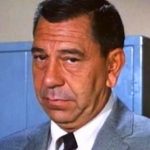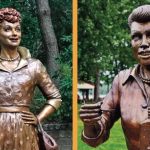Steve McQueen was a world famous American actor whose career peaked during the 1960s and 1970s. There were plenty of popular actors during the time, but only Steve McQueen earned the nickname The King of Cool. His title was well deserved, because he was full of bravado both on screen and behind the scenes. His stunningly good looks endeared him to millions of women, and his impeccable style served as an inspiration to many men.
Steve McQueen appeared in over two dozen films throughout his career. He was best known for playing the role of an antihero. The strong and silent demeanor he most frequently portrayed was incredibly popular, especially during the counterculture movement of the 1960s. Whenever he appeared onscreen, audience members either wanted to kiss him or be him.
Some of Steve McQueen’s most popular films include Bullitt, The Cincinnati Kid, and The Magnificent Seven. In 1966, he starred in the film The Sand Pebbles, and he was nominated for the Academy Award for Best Actor. He was also nominated for four Golden Globe Awards for Best Actor, and he won Best Actor at the 1963 Moscow International Film Festival for his role in The Great Escape.
Steve McQueen As Box-Office Hit
Steve McQueen was a box-office hit. Any director or producer who planned on making an exciting and cool movie knew they needed McQueen’s presence. Despite a brief lapse in his career in film between 1974 and 1977, his appearance never failed to captivate his audiences. His career was just beginning to pick up speed once again by the late 1970s, and this time, he began working as an executive producer, as well. It seemed the King of Cool was planning on becoming more involved in the production of various films. The rest of the world knew they could expect great things from such a revered actor.
During the late 1970s, however, Steve McQueen found himself in the grips of an insidious illness. Terrified for his life, he resorted to drastic measures to save himself. Tragically, he was unable to stop the deadly illness from spreading, and he died on November 7th, 1980.
In today’s video, we’re going to look at the desperate ways Steve McQueen tried, and failed, to save his own life. His death came as a huge shock and tragedy to fans of film all over the world. Still, despite his untimely death, there are many good things to remember about Steve McQueen’s legacy. Make sure you stick around, because we’re going to reveal how his troubled childhood led his mother to send him to reform school.
He Fell Ill in 1978
Steve McQueen took a brief sabbatical from filming after the movie The Towering Inferno was released. He returned to film in 1978, when he worked as both an actor and executive producer in the film An Enemy of the People. Around this same time, however, he became aware of a persistent cough. At first, McQueen thought nothing of it. Over time, however, it grew more troublesome, and he became worried. He quit smoking cigarettes, and even began an antibiotic treatment. Nothing changed, and he grew more concerned about his condition.
His worsening condition didn’t stop him from acting, and he appeared in the 1979 film The Hunter even as the cough grew more pronounced. He developed a shortness of breath, as well. Finally, Steve McQueen underwent a biopsy, which revealed he suffered from pleural mesothelioma, a kind of cancer that is usually attributed to exposure to asbestos.
How He Failed to Save His Own Life
Steve McQueen did his best to hide his condition from the press. In 1980, experts discovered that the cancer had metastasized in numerous locations throughout his body. Despite trying to keep the illness under wraps, The National Enquirer somehow got a hold of the story, and on March 11th, 1980, they announced that Steve McQueen was suffering from terminal cancer.
Fearing for his life, Steve McQueen sought out controversial treatments. His doctors in the US announced that there was nothing more they could do to treat him, so he traveled to Mexico, hoping for something that could save him. He received treatment from an orthodontist named William Donald Kelley, whose medical license had been revoked.
He claimed to have developed a cancer treatment that would work, but there was no medical evidence to back up his claims. Steve paid Kelley about $40,000 in cash every month, but it was to no avail. Huge tumors developed in his abdomen. US doctors warned that these tumors were inoperable, and surgery would likely result in his death, but Steve McQueen wouldn’t listen. He underwent surgery in Mexico, and a tumor weighing five pounds was removed from his body. Sadly, just 12 hours after the surgery, on November 7th, 1980, Steve McQueen died of heart failure.
An Extremely Troubled Childhood
Sadly, the end of Steve McQueen’s life was just as tragic as its beginning. His father left his family before he was even born. His mother, Julia Ann, was an alcoholic who couldn’t cope with the stress of having a child. She surrendered him to her parents, who raised him on a farm for the first eight years of his life. Steve McQueen remembers his early childhood with fondness. When he turns nine, his mother takes him back to live with her new husband.
Steve McQueen’s stepfather was extremely abusive, and young Steve left home and began living on the streets. He joined a number of gangs and began engaging in petty crimes such as theft and vandalism. His mother sent him to live with his grandparents again until he was twelve. When Steve came back to live with his mother once more, his new stepfather was equally abusive, and he returned once again to living on the streets. Fed up with her son’s behavior, Steve McQueen’s mother took drastic measures.
His Mother Sent Him to Reform School
When he was fourteen, Steve’s mother sent him to a reform school called California Junior Boys Republic. Steve McQueen spoke candidly of his experiences there, explaining that, while it was difficult, he learned a lot from the experience. While he got into plenty of fights with the other boys, he began to mature over time. When he was sixteen, he was allowed to leave the school, but he retained a relationship with the institution for many years later. As a movie star, he continued to send donations to the school as a form of repayment and gratitude.
Thankfully, many years after his time in reform school, Steve McQueen’s life would be much better. In fact, he was so famous that he even had to turn down a huge number of amazing opportunities. Make sure you stick around until the very end of the video, where we’ll reveal some of the roles that Steve McQueen turned down. And if you’re enjoying the video so far, please take a moment to like this video and subscribe to our channel for more!
He Joined the Military Before Becoming an Actor
After attending reform school, Steve McQueen enlisted in the Marines. While he had learned a lot from his troubled childhood, he often fell victim to his rebellious nature, and was demoted to private seven times throughout his military career. Despite this rocky start, he eventually embraced the lifestyle of the Marines. He became highly respected after saving the lives of five fellow Marines when a tank broke through the ice in the Arctic and fell into the sea. He served from 1947 to 1950. After that, he studied acting in New York.
His Coolness Sometimes Drew Too Much Attention
Steve McQueen acted alongside Yul Brynner in the 1960 film The Magnificent Seven. Yul Brynner played the lead role, and put in a personal request for Steve McQueen to be cast. Eventually, however, Brynner would regret that choice. Steve McQueen’s natural flair and bravado drew the attention of every audience member, and Yul Brynner felt upstaged during most of the film. He even became worried that Steve McQueen would appear taller than him, even though Brynner was already taller than his fellow actor.
He Had a Need for Speed
It’s no secret that Steve McQueen had a love for any kind of vehicle. He rode cars, motorcycles, and even planes throughout his life. The passion started as a boy, when his great uncle Claude gave him a shiny red bicycle. From there on out, McQueen was captivated. He developed quite the collection of automobiles in his lifetime, including three Ferraris and four Porches. Many of his classic cars were purchased from films he appeared in. Sadly, he was never able to obtain the Ford Mustang GT 390 which he drove in the movie Bullitt.
He Turned Down a Lot of Roles
Being a certified movie star isn’t always easy. Unfortunately, Steve McQueen had to make a lot of tough decisions throughout his career, which sometimes involved turning down roles. He was offered a role in the classic film Breakfast at Tiffany’s, but he had to turn it down due to a previous contract. Throughout his career, he also turned down roles in Ocean’s 11, Butch Cassidy and the Sundance Kid, and Apocalypse Now.
Steve McQueen’s death was especially tragic because there was so much left for him to accomplish. Were you more surprised that he was sent to reform school as a child, or by all of the amazing roles he had to turn down? Let us know in the comments below, and don’t forget to subscribe to Facts Verse for more!


